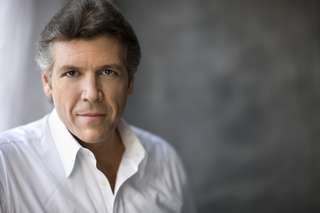|
Back
Zemlinsky Reborn New York
Avery Fisher Hall, Lincoln Center
11/05/2009 - & November 6*, 7, 10, 2009
Ludwig van Beethoven: Overture to The Creatures of Prometheus, op. 43
Wolfgang Amadeus Mozart: Symphony No. 38 in D Major (“Prague”), K. 504
Alexander Zemlinsky: Lyric Symphony in Seven Poems by Rabindranath Tagore, Opus 18
Hillevi Martinpelto (Soprano), Thomas Hampson (Baritone)
New York Philharmonic Orchestra, Neeme Järvi (Conductor)

T. Hampson (© Dario Acosta)
Paraphrasing Voltaire on God, “If Gustav Mahler hadn’t written the song-symphony, Song of the Earth, Zemlinsky would have had to invent it.”
Alexander Zemlinsky isn’t played much these days, and his most famous work, this 45-minute song-symphony, based on seven romantic songs by the Bengali poet Rabindranath Tagore, hasn’t been heard in New York for exactly 30 years. Then again, his friend Mahler already having written his “Chinese” song-symphony, one must ask respectfully, “Why bother?”
That doesn’t sound respectful, and one must be happy that the ever inventive Neeme Järvi uncovered the piece for New York audiences. Superficially, the form of the work, starting with the outburst of the orchestra, ending with a peaceful close, using a baritone and soprano separately, and employing two German translations of “exotic” Chinese and Indian poems, the two ultra-late Romantic composers could have had twin works, written twelve years apart.
But under Järvi’s baton with a New York Philharmonic fresh from travels abroad, the work was obviously different. For one thing, Zemlinsky let his orchestra go on without a break, while Mahler separated the songs. For another, Mahler’s use of the orchestra was as delicate as chamber music, while Zemlinsky used the full ensemble, with two notable exceptions.
Both these exceptions came in the middle two songs. A gorgeous duet between baritone Thomas Hampson and Phil horn-player Philip Myers in the third song; and the fourth short song, where Swedish soprano softly sung of her love, accompanied by equally soft violin solo, winds and a celesta.
The choice of poems shows another difference. Mahler spans the work of Li Po, who wrote of loneliness, friendship life, drunkenness, sorrow and joy. Tagore’s seven poems were reminiscent of the Song of Solomon: a continual story of a lonely prince, a lonely girl, their amorous embraces, and their final parting.
But the main difference may be that where Mahler was a great composer, Zemlinsky was a good composer. One can see where Zemlinsky pushed for dramatic climaxes in the first song, and the most delicate ending in the final one. He certainly came near the former. But Mahler, having written “Der Abschied” for Song of the Earth, was God to Zemlinsky’s earthly (if rarely mundane) Man.
The piece does need two soloists of Wagnerian proportions to make the drama come alive, and Mr. Hampson, the Phil’s “artist-in-residence” fit the bill with singing that had the clearest enunciation, the most powerful voice and a truly soaring baritone when needed. Next to this, Ms. Martinpelto seemed intimidated in her first song. But in that lovely “Speak to me, my love”, she and the strings blended together with gossamer lightness.
The first half had an energetic Prometheus overture (it’s pretty comical work despite the figure to whom Beethoven has been compared), and then an energetic no-nonsense “Prague” symphony. Mr. Järvi didn’t repeat the exposition of the first movement, but brought us straight to that contrapuntal maze. For the finale, the conductor offered Mozart’s bawdy humor at its best, martial trumpets and drums vying with teeny-weeny flute solos in an elephant-and-mouse duet.
Harry Rolnick
|